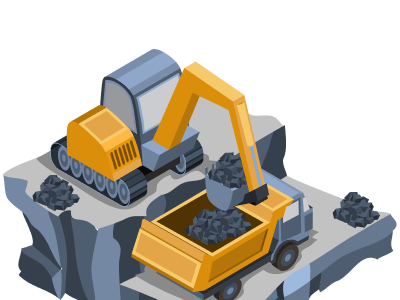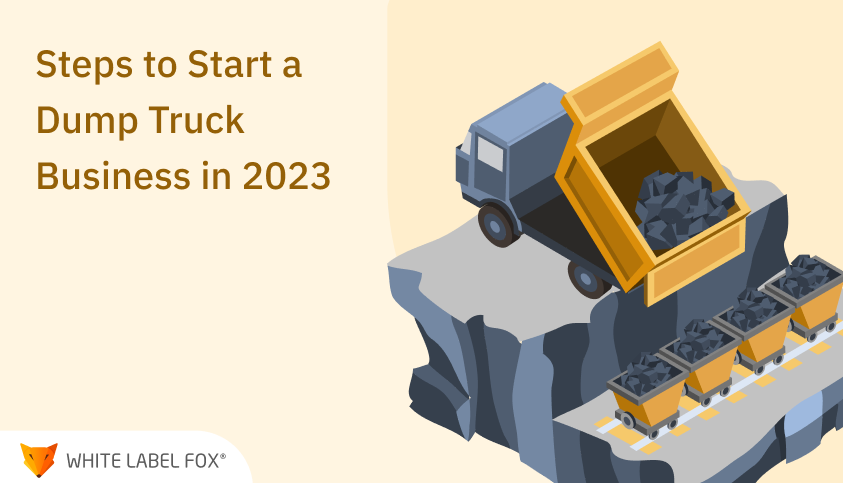Most business owners have experienced the hardest hit amid pandemics. However, it has also unlocked various opportunities for many businesses, including transport and logistics businesses. Many entrepreneurs are thinking of starting a dump truck business as it can help in exposing the business locally without making more effort. “How to begin a dump truck service business in 2022” is one hot question that hits entrepreneurs’ minds.
The global dump trucks market size reached around 6.32 Billion in 2018 and is projected to reach 10.83 Billion by 2026, exhibiting a 7% CAGR between 2021 and 2027. Rising mining sites for metals extraction and construction projects will likely drive industry growth.

Image: (Source)
After a long halt, excavation, construction, drilling, demolition, and mining of wastes have started, and this can bring a significant opportunity for you to make a better start. Whether private or corporate deliveries, companies providing their dump truck services or outsourcing fleet work create a demand that drives tremendous opportunity for those just getting into the field.
Why Start a Dump Truck Business?
According to Grand View Research, rising construction and mining activities, technological advancement, and increased spending on sustainable infrastructure propelling demand for advanced dump trucks are anticipated to drive the market.
Are You Planning To Develop A Custom App Like Dump Truck Business
Talk To Our Experts And Discuss Your Ideas.

The need for such vehicles is linked to increasing urbanization, infrastructure developments, and population. Increasing mining and construction activities in Australia, Asia Pacific, and China will drive the market over the forecast period.
Dump truck services in the US market will be $19.8bn in 2022 while showing 3.9% of growth. Dump trucks are typically used in the mining and construction industries. It can be used for off-road purposes, which limits the availability of gigantic trucks for some companies. Hence the number of dump trucks that are needed every year within the industry is limited.
However, the dump truck maintenance cost is relatively high; brands with specific requirements will actively pursue a purchase. This limits the customer’s growth opportunities for the industry dramatically compared to other industries. The growth of the dump truck industry depends upon infrastructure projects. Proposals in the US to spend around $1 trillion on infrastructure projects through 2028 assembles the potential for substantial growth within this industry. However, the overall industry continues to increase at a 1 to 2% annual rate each year.
Starting any business is not an easy task. However, it can be a gratifying adventure for you and the clients you serve. A dump truck business will allow you to make the whole construction process smoother for many companies. There are various benefits that you can enjoy by choosing to offer a dump truck business service online; these include:
- Right truck investment can help you bring massive cash to the table
- Provides employment opportunities
- Contributes to a growing economy
- Provides options to leverage technology
Are you looking to start a dump truck business? White Label Fox can help you with the complete development process. Starting business service online with an Uber tow truck or dump truck is quite simple and proves beneficial for you and the economy. It may come with a few ups and downs but will prove profitable in the long run.
Just find the right track and get started to make a significant profit. Utilizing an online platform can help you track and manage driver progress and invoices; it also makes it straightforward for you to collect payments, communicate, and more that streamline the business. You can even use a feature-rich solution to receive work and manage contractors.
Essential Steps to Follow for Establishing a Dump Truck Business
Will investing your savings into the dump truck service business pay off? Undoubtedly, starting a dump truck business can be challenging. Operational costs can be high at the initial stage, but the good news is that the industry is $19 billion and is predicted to grow annually by 1.8% over the next five years. Hence, it wouldn’t be unfair to conclude that there is a huge profit operating a dump truck enterprise.
One of the top advantages of starting a dump truck service business is that it’s not dependent on the season. Even during the pandemic spread, when the entire tours and transport sector was shut down, the dump truck business remained ongoing.
Some of the work done by a dump truck includes collecting garbage, excavating to transport essentials, and more. As the dump truck business offers excellent opportunities, many choose to start the same business. If you’re wondering how to start a successful dump truck business, going through the following steps can help you make the right decision.
Market Analysis
More than 50% of businesses fail within five years of their establishment, while 70% within 10 years. Poor market analysis is not only one factor of business failure; there are many. No matter whether you want to start small or big, you must get familiar with the market. Understanding the market is crucial as it helps make a complete dump truck business plan. You can begin with:
- Market Trends and Scope
- Know your target market
Select Pleasing Business Name
It’s your business name that leaves the first impression; hence selecting a pleasing one can be beneficial. You can choose it randomly rather than spending time in research and finding an easy-to-remember and catchy name. Deciding a business name depends on the business type entity.
Register Your Business and Get an EIN
Once you decide on your business name, the next step is to get it registered and get an EIN. Visit the Secretary of State’s office in the region and mention where you’re planning to start your business. You will get all details from the business bureau section and search the list of papers you need to submit to complete the registration process.
SWOT Analysis (Funding, Insurance, and Employee Needs)
The best way to begin a business is to know the lacking points, maximize strength, explore opportunities, and stay aware of threats. To know all, you need to conduct a SWOT analysis which stands for Strength, Weakness, Opportunities, and Threats.
It will prove to be a winning step when you are choosing to start a dump truck business. From dwindling economy and stiff competition to volatile costs and increasing fuel prices, you have got many potential threats to tackle against. With good preparation, you can work through threats to the business.
Obtain Commercial License & Permits
Do you have expertise in driving? If yes, then the main obstacle is to get a driving license. It’s required to get a particular class of license. You can apply for a nationwide permit to operate the dump truck business. If you do not know how to drive, complete a local truck driving course and obtain a license to get a license to start a dump truck business.
Open Business Checking Account
The next step in the process to start a dump truck business is to separate the personal finance. You can open a business account and get a business credit card. It enables you to do financial transactions, including expenses, purchases, and more, from a separate business account.
Marketing Plan
Nothing can be achieved without building relationships and marketing the business. Let more and more people know what your business is all about. It’s important to identify potential customers and understand their needs and decide to meet their demands. When you know your audience, making a marketing plan becomes easy. Create a marketing channels list and platforms, and learn to utilize them all.
Empower Your Business with Digitization
With the increasing internet and smart apps usage, it becomes essential to opt for trends that help you turn your dump truck business into more customer-centric. It fulfils your targets no matter whether it’s engagement, sales, or conversion. Digitization can help you achieve your targeted goals with ease and provide new ways to do business.
Taking your dump truck business online can help you offer more convenience and comfort to customers. Starting a dump truck business with digital support can cut down the additional expenses to zero and improve your business revenue and efficiency. When you want to expand your business, digitization is the initial step. If you want to give a digital touch to your business and want a quote, please find it here https://whitelabelfox.com/get-a-free-quote/
Final Words
There are lots of things that you need to consider when it comes to starting a dump truck business. What you need to do is stick to the end goal and keep working to achieve the same. The above guide can help you make a good start to a successful dump truck business.
Get an advanced dump truck business solution that makes it easier for you to connect with the masses, grow your business, and cater to the growing demand. The customer-centric app will help you achieve your end goals and become a high-growing company. Besides, it enables you to increase engagement, turn visitors, and gain trust. Want to get your dump truck business mobile app developed, contact our team today: [email protected].
Frequently Ask Questions
A dump truck business involves providing transportation services for
construction materials, debris removal, and other types of hauling. You
operate dump trucks to move materials such as sand, gravel, dirt, and
demolition waste for construction sites, landscaping, and other
industries. The business can involve either owning and operating the
trucks yourself or subcontracting to construction companies,
landscapers, and other industries requiring hauling services.
The costs to start a dump truck business can vary widely based on
location, scale, and type of equipment. On average, you can expect the
following costs:
- Dump Truck Purchase: A new dump truck can cost between
$80,000
to
$150,000, while used trucks can be priced around $20,000 to
$50,000,
depending on age and condition.
- Licensing and Permits: This could range from $500 to
$5,000,
depending on your location and specific requirements.
- Insurance: Expect to pay around $6,000 to $12,000
annually for
commercial vehicle insurance.
- Fuel and Maintenance: These ongoing costs depend on the
number
of
trucks you operate and the distance traveled, but budgeting
around
$10,000 to $20,000 per year is a safe estimate.
- Marketing: Initial marketing efforts could cost anywhere
from
$1,000
to $5,000 for local advertising, online campaigns, and business
materials.
- Dump Truck Purchase: A new dump truck can cost between $80,000 to $150,000, while used trucks can be priced around $20,000 to $50,000, depending on age and condition.
- Licensing and Permits: This could range from $500 to $5,000, depending on your location and specific requirements.
- Insurance: Expect to pay around $6,000 to $12,000 annually for commercial vehicle insurance.
- Fuel and Maintenance: These ongoing costs depend on the number of trucks you operate and the distance traveled, but budgeting around $10,000 to $20,000 per year is a safe estimate.
- Marketing: Initial marketing efforts could cost anywhere from $1,000 to $5,000 for local advertising, online campaigns, and business materials.
To start a dump truck business, you'll need to fulfill several legal
requirements:
- Commercial Driver’s License (CDL): You’ll need a CDL to
drive a
dump
truck for business purposes.
- DOT Number and MC Number: If your business operates
across state
lines or carries hazardous materials, you must register with the
U.S. Department of Transportation (DOT) and get a Motor Carrier
(MC)
Number.
- Business Structure: Decide on a business structure (LLC,
sole
proprietorship, or corporation) and register with your state.
- Local Permits and Licenses: Depending on your location,
you may
need
a business license, waste disposal permits, or additional local
permits for hauling materials.
- Commercial Driver’s License (CDL): You’ll need a CDL to drive a dump truck for business purposes.
- DOT Number and MC Number: If your business operates across state lines or carries hazardous materials, you must register with the U.S. Department of Transportation (DOT) and get a Motor Carrier (MC) Number.
- Business Structure: Decide on a business structure (LLC, sole proprietorship, or corporation) and register with your state.
- Local Permits and Licenses: Depending on your location, you may need a business license, waste disposal permits, or additional local permits for hauling materials.
The type of dump truck you choose will depend on your business needs,
budget, and operational requirements. Some popular dump truck types
include:
- Standard Dump Truck: A conventional dump truck with a
hydraulic
lift
for tipping the load, typically used for hauling materials like
dirt, gravel, and sand.
- Transfer Dump Truck: Features a trailer and allows for
greater
hauling capacity, making it ideal for larger-scale projects.
- Side Dump Truck: A truck that dumps its load from the
side,
ideal
for projects where space is limited.
- Articulated Dump Truck: These trucks are ideal for rough
terrains
and are used in construction and mining operations.
- Standard Dump Truck: A conventional dump truck with a hydraulic lift for tipping the load, typically used for hauling materials like dirt, gravel, and sand.
- Transfer Dump Truck: Features a trailer and allows for greater hauling capacity, making it ideal for larger-scale projects.
- Side Dump Truck: A truck that dumps its load from the side, ideal for projects where space is limited.
- Articulated Dump Truck: These trucks are ideal for rough terrains and are used in construction and mining operations.
Finding clients is crucial to growing your dump truck business. Some
ways to find clients include:
- Networking: Attend local construction and industry events
to
network
with potential clients, such as construction firms, landscapers,
and
municipalities.
- Online Marketing: Create a website and leverage social
media
platforms to reach out to potential customers. Use SEO to rank
your
website for relevant keywords such as “dump truck services” or
“haulage companies.”
- Subcontracting: Reach out to larger construction firms to
subcontract your services. Many companies need dump truck
services
but don’t have their own fleet.
- Referrals: Encourage satisfied clients to refer your
services to
others by offering discounts or incentives for referrals.
- Networking: Attend local construction and industry events to network with potential clients, such as construction firms, landscapers, and municipalities.
- Online Marketing: Create a website and leverage social media platforms to reach out to potential customers. Use SEO to rank your website for relevant keywords such as “dump truck services” or “haulage companies.”
- Subcontracting: Reach out to larger construction firms to subcontract your services. Many companies need dump truck services but don’t have their own fleet.
- Referrals: Encourage satisfied clients to refer your services to others by offering discounts or incentives for referrals.
A dump truck business can generate revenue in various ways:
- Per-Hour Charges: Charging by the hour for transporting
materials or
debris.
- Per-Ton or Per-Mile Charges: Charging based on the weight
of the
load or the distance traveled.
- Flat Fees: Charging a flat fee for certain services, such
as
debris
removal or material delivery.
- Contract Work: Securing long-term contracts with
construction
companies, government agencies, or landscaping firms for regular
hauling services.
- Per-Hour Charges: Charging by the hour for transporting materials or debris.
- Per-Ton or Per-Mile Charges: Charging based on the weight of the load or the distance traveled.
- Flat Fees: Charging a flat fee for certain services, such as debris removal or material delivery.
- Contract Work: Securing long-term contracts with construction companies, government agencies, or landscaping firms for regular hauling services.
The dump truck business presents several challenges, including:
- High Operating Costs: Maintenance, fuel, and insurance
are
ongoing
expenses that can add up quickly.
- Competition: Many local and national players compete in
the dump
truck industry, making it crucial to differentiate your business
through customer service and pricing.
- Weather Conditions: Bad weather can affect construction
schedules
and the demand for your services.
- Driver Shortages: Recruiting and retaining skilled
drivers can
be
difficult in the trucking industry.
- High Operating Costs: Maintenance, fuel, and insurance are ongoing expenses that can add up quickly.
- Competition: Many local and national players compete in the dump truck industry, making it crucial to differentiate your business through customer service and pricing.
- Weather Conditions: Bad weather can affect construction schedules and the demand for your services.
- Driver Shortages: Recruiting and retaining skilled drivers can be difficult in the trucking industry.
To scale your dump truck business, consider:
- Expanding Your Fleet: Gradually add more trucks as demand
for
your
services increases.
- Diversifying Services: Offer additional services like
snow
removal,
debris clearing, or material supply to widen your customer base.
- Hiring More Staff: Hire more drivers, dispatchers, and
administrative staff to handle more contracts and operations.
- Improving Marketing Efforts: Invest in online marketing,
SEO,
and
local advertising to attract new clients and expand your reach.
- Expanding Your Fleet: Gradually add more trucks as demand for your services increases.
- Diversifying Services: Offer additional services like snow removal, debris clearing, or material supply to widen your customer base.
- Hiring More Staff: Hire more drivers, dispatchers, and administrative staff to handle more contracts and operations.
- Improving Marketing Efforts: Invest in online marketing, SEO, and local advertising to attract new clients and expand your reach.
Proper maintenance is essential to keep your dump trucks running
smoothly:
- Routine Inspections: Conduct regular inspections of each
truck,
checking for tire wear, engine performance, and brake condition.
- Oil Changes and Fluid Checks: Perform regular oil changes
and
check
fluid levels to keep engines running efficiently.
- Tire Maintenance: Ensure that tires are properly inflated
and
replaced when necessary to avoid breakdowns.
- Scheduled Repairs: Plan for periodic repairs to address
wear and
tear, including hydraulic system maintenance and electrical
checks.
- Routine Inspections: Conduct regular inspections of each truck, checking for tire wear, engine performance, and brake condition.
- Oil Changes and Fluid Checks: Perform regular oil changes and check fluid levels to keep engines running efficiently.
- Tire Maintenance: Ensure that tires are properly inflated and replaced when necessary to avoid breakdowns.
- Scheduled Repairs: Plan for periodic repairs to address wear and tear, including hydraulic system maintenance and electrical checks.
















